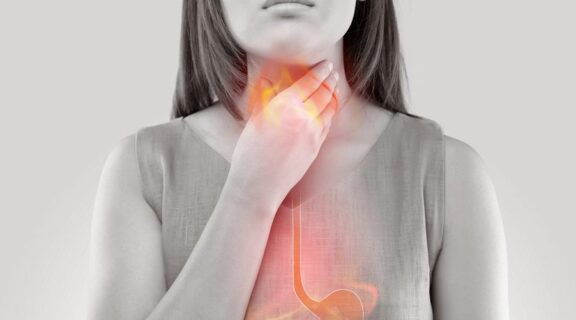Feeling discomfort after eating a large or fatty meal? You’re not alone. Heartburn is estimated to affect 1 in 4 adults in the UK. It’s usually described as a “burning” pain that occurs in the centre of the chest, around the lowest end of the sternum.
Associated with eating fatty foods or excessive alcohol, it’s a painful condition that’s linked to acid reflux. If you frequently experience heartburn or suspect acid reflux, a gastric reflux test is recommended. It can help pinpoint the underlying issue.
We often talk about acid reflux and heartburn interchangeably. Technically, however, they refer to slightly different things. Below, we explain the key differences, covering everything you need to know about heartburn vs acid reflux.
In this guide:
Heartburn vs Acid Reflux
What is Heartburn?
Heartburn is a burning (often painful) feeling in the chest. It’s caused by stomach acid leaking into the food pipe (oesophagus) and moving up towards the throat.
Unlike acid reflux, heartburn isn’t a medical condition – it’s a symptom. People find that it worsens after eating, lying down, or bending over, as the acid finds it easier to enter the oesophagus.
Certain foods and drinks are known to trigger the symptoms, including fatty foods, spicy or rich food, alcohol, chocolate, and citrus fruits. Other factors include smoking, pregnancy, stress and anxiety, and obesity.
Heartburn Symptoms
Heartburn is a symptom itself. However, you may notice associated symptoms, including:
- A burning sensation in the chest, especially after eating
- Pain or discomfort in the chest that may worsen when lying down or bending over
- A sour or bitter taste in the mouth
- Difficulty swallowing
- A sensation of food or liquid rising into the throat (acid regurgitation)
- Chronic cough or sore throat
What is Acid Reflux?
If heartburn is the symptom, acid reflux is the underlying cause. It involves the reflux or movement of acid from the stomach and into the oesophagus. This shouldn’t be confused with indigestion, which is a general term for discomfort after eating.
When the acid enters the oesophagus, it causes immense irritation. If the condition persists, it can even begin to change the oesophagus, increasing the risk of cancer. Recurrent acid reflux is known as gastroesophageal reflux disease (GORD).
A gastric reflux test is recommended if you experience frequent episodes of acid reflux.
Acid Reflux Symptoms
The symptoms are similar to those associated with heartburn. However, you may notice them becoming more severe if you have GORD.
- Heartburn (burning sensation in the chest)
- Regurgitation of sour or bitter-tasting acid into the throat or mouth
- Difficulty swallowing (dysphagia)
- Chest pain, especially after eating
- Chronic cough or throat irritation
- Hoarseness or a sore throat
- Feeling of a lump in the throat
- Nausea, particularly after meals
- Excessive burping or bloating
Causes of Acid Reflux
Diet is the primary cause of acid reflux. Eating foods that irritate the stomach or cause excess production of acid can lead to heartburn. Examples include rich, fatty, spicy, or acidic foods.
As mentioned, changing the position of your body lets gravity trigger symptoms. Acid leaks from the stomach into the oesophagus, leading to discomfort.
Pregnancy hormones are another common cause. These hormones relax the muscular ring (sphincter) that closes the stomach to the oesophagus. When it’s relaxed, the stomach contents can easily move upwards. The baby may also press against the stomach in the later stages of pregnancy.
Lastly, there is a hiatus hernia, when the upper part of your stomach pushes through the diaphragm into your chest. More common in people over 50 or who are overweight or obese, it affects around 15-25% of the population.
Taking a Test for Acid Reflux Disease
Heartburn might sound characteristic of acid reflux. Chest pain is a common symptom for several conditions, however. Undergoing a gastric reflux test is the best option to diagnose acid reflux disease.
Reflux testing involves monitoring for 24 hours. During the test, a small tube is inserted via the nose down into your stomach. At the end of the tube is a recording device that monitors your acid levels. The device is worn for 24 hours to measure the fluctuations in stomach acid levels and detect the presence of acid in the oesophagus.
You can wear the tube and recorder without issue, carrying on your normal daily activities. That includes eating, drinking, and speaking as you usually would. (In fact, it’s crucial to behave as usual for the test to be accurate.)
After 24 hours, the tube is removed, and the collected data is analysed to see if any acidic or non-acidic reflux occurs. You may have an endoscopy if your results are positive to assess any damage to the oesophagus.
Treating Acid Reflux and Heartburn
If your gastric reflux test diagnoses acid reflux, you will require treatment. Persistent acid reflux damages the oesophagus and increases the risk of cancer.
The first-line treatment is a proton pump inhibitor (PPI), a medication which stops your stomach producing acid. Common examples include omeprazole and lansoprazole (these drugs always end in -prazole).
Your doctor may recommend several lifestyle changes, including:
- Eat small, more frequent meals.
- Try to lose weight
- Relieve stress or anxiety
- Avoid eating within 3-4 hours before bed
- Reduce alcohol consumption
- Stop smoking
- Minimise eating food or drink that triggers your symptoms
If you’re worried about acid reflux or heartburn, consider ordering a gastric reflux test. This test helps identify the cause of your symptoms and provides a comprehensive report on the findings. Following the test, you’ll have a consultation with a doctor who will explain the results and guide you on the next steps for managing your condition.
Ready to understand your symptoms? Call us on 0207 486 7777 or send us an email at admin@thefunctionalgutclinic.com.

